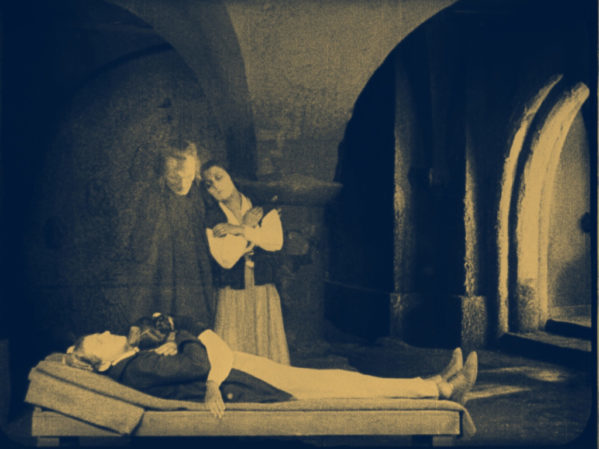REVIEW: ‘Destiny’ is early Fritz Lang meditation on death

Destiny (Der müde Tod), currently playing at the Film Forum in New York, plays like a cinematic fairy tale with the oft-repeated lesson that one can never outrun death. In the 1921 film, Bernhard Goetzke plays Death in all of his characteristic flair. He’s tall, with piercing eyes and a cold expression. His black garments hover around him like a warlock’s garb. His dialogue is to the point and mysterious. As one of the earliest cinematic incarnations of Death, Goetzke’s interpretation is spot-on horrifying. Much credit should be given to the actor but also Fritz Lang, the legendary German director who created Destiny.
The story is told in a number of verses, and it has a definite literary feel. In fact, literature experts will note the obvious similarities to German fairy tales, including Godfather Death by the Grimms.
Death arrives in town wanting to buy property adjacent to the old cemetery (of course!). He builds walls around the estate and purposely leaves doors and windows out of the blueprints. The town elders, representing money, politics and high society, are suspicious of this strange outsider, and the high walls of his land obscure his malevolent actions.
Lil Dagover plays a young woman whose lover disappears, and Death, naturally, is the main suspect. To teach her about his ways, Death shows her a series of candles that represent individual lives (this part of the plot seems particularly taken from Godfather Death). Once the candle is extinguished, the person dies.
To prove his point, Death tells three tales about lovers trying to outrun his odious deeds. In each one, representing different cultures from around the world, the fate is the same, and the young woman learns a helpful lesson. No matter what one does, no matter how one pleads, there is no escaping his wrath.

The film has a clear-cut narrative arc and is largely helped by the verse structure. Lang stays focused throughout the 95 minutes and gathers convincing performances from his silent-film actors. Dagover and Goetzke have much of the screen time and carve out full-on portraits of someone yearning for life and someone cursed to deliver death.
The print at the Film Forum has been restored by Anke Silkening with its original German intertitles and color tinting. Cornelius Schwehr’s accompanying score is beautifully rendered by the Berlin Rundfunk Symphony Orchestra.
Lang, of course, would go on to become a legend in German cinema, especially for his masterpiece six years later, Metropolis. Although Destiny never ascends to those heights, it’s obvious after watching the story unfold that the director is a maestro of the macabre and fully in control of his available technology. For a film that is 95 years old, Destiny holds up well. The narrative, intertitles, characters and general atmosphere keep the audience riveted and guessing. This being the work of a fairy tale, the ending is quite obvious, but the journey to the conclusion is unique.
One thrilling sequence involves a moral dilemma involving a burning house. Besides the important question of humanity that the scene considers, the actual set and staging are gargantuan in scope and nicely realized. The ominous color tinting helps set the mood and keep the proceedings rightfully off-putting.
By John Soltes / Publisher / John@HollywoodSoapbox.com
- Destiny
- 1921
- Directed by Fritz Lang
- Written by Lang and Thea von Harbou
- Starring Lil Dagover and Bernhard Goetzke
- Running time: 95 minutes
- Rating:





